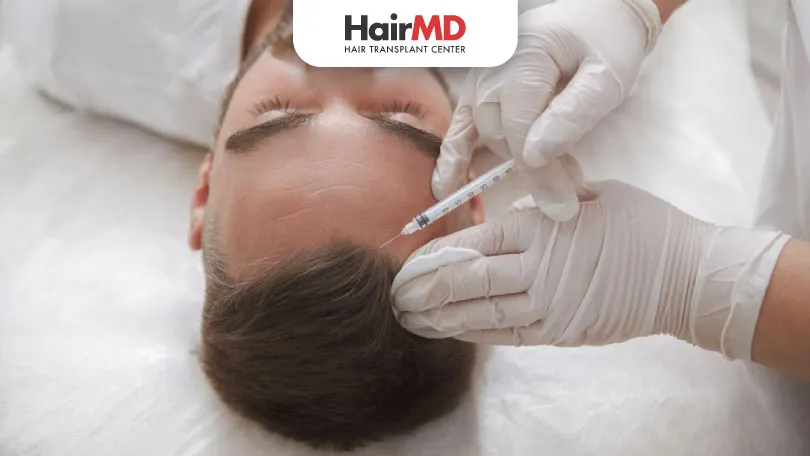29th Feb, 2024

Hair loss is different from hair shedding. In hair loss, more than the normal number of strands of hair fall out every day with no signs of regrowth. Hair can be observed everywhere in the house, and no regrowth can foster baldness. Many reasons lead to hair loss; in some cases treating the cause on time can reverse the hair loss.
What’s covered in the article?
- What is PRP Therapy for Hair Loss?
- Benefits of Platelet-Rich Plasma Therapy
- Does PRP for Hair Regrowth Work?
- Success Rate of PRP Therapy for Hair Loss
- Side Effects of PRP for Hair Loss
- Conclusion
What is PRP Therapy for Hair Loss?
PRP for hair loss is an effective treatment therapy derived from modern science. In the therapy, platelet-rich plasma is extracted from the blood by the centrifugation method. The centrifugation method separates the plasma rich in platelets present in the blood and other vital proteins beneficial for hair regrowth. The trichologist then injects the extracted fluid into your scalp, which helps to stimulate the hair cells, thereby promoting hair growth.
Benefits of Platelet-Rich Plasma Therapy
PRP is a common treatment that can help treat problems like osteoarthritis and tendon injuries. The therapy is also beneficial for the treatment of androgenetic alopecia or male and female pattern baldness. Androgenetic alopecia is a hair condition that occurs due to the stimulation of an androgen hormone called DHT or dihydrotestosterone, which tends to attach to the hair follicles and causes hair loss. It is a genetic hair loss problem; however, PRP therapy can treat this severe hair loss condition and promotes hair growth with the help of growth factors present in the platelets with regenerative properties.
Does PRP for Hair Regrowth Work?
Yes, platelet-rich plasma does work for hair regrowth in patients suffering from androgenetic alopecia. The treatment tends to rejuvenate the scalp and promotes hair regrowth by stimulating the hair follicles. As per studies it is suggested that the therapy helps thicken and strengthen the hair, which prevents hair loss due to male and female pattern baldness where hair gets thin and ultimately falls out. PRP for hair regrowth is one of the best solutions for the conditions like androgenetic alopecia.
Success Rate of PRP Therapy for Hair Loss
Every human is different, and their bodies react to various treatments differently. Science itself has accepted that some people might observe positive changes with treatment while others see slow responses. The PRP for hair loss is a promising therapy; however, it is not 100% assured that it will work for everyone and promote hair regrowth. Also, multiple sessions are required to see adequate results.
Platelet-rich plasma therapy has several promising results. However, in some cases, it cannot help the patient preserve their hair loss. You must consult a hair doctor to know if the treatment will be suitable for you or not. The doctor, depending on the assessment of your hair loss, will prescribe other treatments that may be effective. PRP involves the use of one’s own blood and is thus one of the safe methods to try; however, consultation from a professional is highly recommended.
Side Effects of PRP for Hair Loss
Platelet-rich plasma is one of the most effective hair loss treatments. However, you may observe some side effects after the completion of the procedure:
- Infection
You may also observe an infection at the site where PRP was injected.
- Pain and Headache
You may feel slight pain in the scalp and headache after the completion of the procedure
- Minimal Bleeding
The sites of injection may have minimal bleeding during and post-procedure.
Do You Know?
Nearly 250 Patients Visit HairMD
Everyday For Various Hair Concerns?
(Your journey to healthier and fuller hair starts here!)
Meet Our Dermatologists
Conclusion
Further Reading
Rosemary Oil for Hair Growth: Benefits and Side Effects
Explore the benefits of rosemary oil for hair growth & learn about its potential side effects. Our guide covers how to use rosemary oil to promote healthy hair growth.
How Much Hair Loss is Normal for Teenage Male?
Understand normal hair loss in teenage males and when it may signal an issue. Visit HairMD Pune for expert advice on teenage hair health and treatment options.
Ultimate Food Guide For Healthy Hair
Struggling with hair fall? This Food For Healthy Hair guide shares easy diet tips to support stronger, healthier hair naturally.
How to remove scabs after Hair Transplant? | HairMD
The correct way to remove scabs after hair transplant without damaging grafts. Get expert-backed tips from HairMD Pune to support a smooth recovery.
Have thoughts? Please let us know
We are committed not only to treating you, but also educating you.














